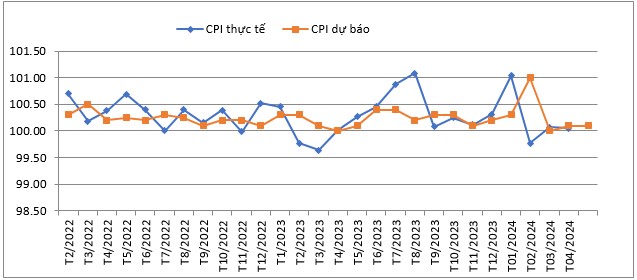World market
In July 2024, geopolitical and economic risks in many countries continued to impact global commodity prices. The ongoing conflict in the Middle East, coupled with China's unstable economic recovery, caused oil and metal prices to plummet.
+ Fuel group
Crude oil prices have been continuously falling due to a strong US dollar and mixed economic signals, impacting investor sentiment. In addition, growing concerns about declining demand in China due to slower-than-expected growth have also affected oil prices.
Oil prices have fallen to a six-week low, with Brent crude at just $81.01 per barrel and US WTI crude dropping to $76.96 per barrel.
However, oil prices found some support as the US government reported a larger-than-expected weekly drop in oil inventories and US economic growth in the second quarter of 2024 reached a higher-than-expected level.
+ Metal group
Over the past month, the price of Chinese construction steel has continuously fallen due to the gloomy outlook for demand in China.
Iron ore prices briefly hit their lowest level in three months due to persistent deflationary pressures and a sluggish real estate sector.
Prices for most steel types traded on the Shanghai Futures Exchange fell on July 29. Rebar dropped nearly 0.4%, hot-rolled coil fell nearly 1.2%, and wire rod fell about 0.7%.
In contrast to iron and steel, gold prices continue to be volatile, at times reaching their highest level in nearly two months, supported by hopes of a Fed interest rate cut. In the short term, the prospect of a Fed interest rate cut in September will continue to support gold prices.
+ Agricultural products group
Favorable weather conditions have impacted supply, causing prices of many agricultural products to fall.
Wheat prices continued their downward trend amid forecasts of abundant US spring wheat production, and lower prices offered by Black Sea exporters also contributed to the price drop.
US soybean and corn prices briefly touched multi-year lows, but have since edged back up due to increased buying activity and forecasts of reduced crop yields in some parts of the world.
Domestic market
In July 2024, the macroeconomic situation continued to maintain a positive trend, major economic and social balances were ensured, and wage increases were implemented according to schedule.
However, our country's socio-economic situation still faces many difficulties and challenges. The global and regional situation continues to evolve rapidly, complexly, and unpredictably. Domestically, the economy has both opportunities and challenges, but the difficulties and challenges are more numerous, such as inflationary pressure; the financial and monetary markets still harbor potential risks; and investment, production, and business activities in some sectors are still recovering slowly…
According to the latest report from the General Statistics Office, the consumer price index (CPI) in July 2024 increased by 0.48% compared to the previous month, by 1.89% compared to December 2023, and by 4.36% compared to the same period last year.
The increase in the consumer price index is due to rising domestic gasoline and diesel prices in line with world prices, increased demand for household electricity, and adjustments to health insurance contributions based on the new minimum wage.
Overall, the Consumer Price Index (CPI) from the beginning of the year to date has shown an upward trend compared to the same period last year, rising from 3.37% in January 2024 to a peak of 4.44% in May 2024. In June 2024, the CPI increase slowed to 4.34%, and in July 2024 it rose to 4.36%.
Overall, in the first seven months of the year, the Consumer Price Index (CPI) increased by 4.12% compared to the same period last year. The main reasons for this are: tuition fees increased in the 2023-2024 school year in some provinces and centrally-governed cities according to resolutions of the provincial People's Councils; medical service prices were adjusted according to Circular No. 22/2023/TT-BYT of the Ministry of Health; and health insurance premiums increased in line with the basic salary. In addition, prices for housing, electricity, water, fuel, and construction materials; and food and beverage services increased due to increased consumer demand during the festive and tourism season.
Chart: Actual CPI vs. Forecast by VITIC
Source: VITIC compilation
Inflationary pressures in the final months of the year may stem from government adjustments to the minimum wage, increases in healthcare and education services, and electricity prices according to a planned schedule. However, in the remaining months of 2024, the following factors could slow down the rate of increase in the price index:
- Major economies are keeping interest rates unchanged or lowering them slowly, and the continued stagnation of the global economy makes it difficult for world commodity prices to rise sharply.
- Domestic consumer demand remains weak.
- The supply of basic foodstuffs is stable.
- Credit growth remains quite low.
- The upward pressure on the USD/VND exchange rate will ease as the Fed cuts interest rates, potentially causing the USD to depreciate in international markets.
- Risks to oil prices will be mitigated due to continued weak demand in the global market, particularly in China.
Based on comprehensive analysis, the Center for Industry and Trade Information forecasts that the CPI in August 2024 may increase by approximately 0.2% compared to the previous month.
Source: https://moit.gov.vn/tin-tuc/thi-truong-trong-nuoc/du-bao-cpi-thang-08-2024.html












































































![[Infographic] 6 cases where simplified bankruptcy procedures apply](https://vphoto.vietnam.vn/thumb/402x226/vietnam/resource/IMAGE/2026/02/27/1772207933687_info-nam-10-jpg.webp)

















Comment (0)